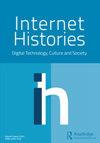Cypherpunk ideology: objectives, profiles, and influences (1992–1998)
IF 1.2
Q3 COMMUNICATION
引用次数: 6
Abstract
Abstract The cypherpunks were 1990s digital activists who challenged White House policies aiming to prevent the emergence of unregulated digital cryptography, an online privacy technology capable of frustrating government surveillance. Whilst the cypherpunk’s ideology, which is predominantly the output of Timothy C. May, is well understood, less is known about the composition of the cypherpunk’s community. This article builds on past studies by Rid and Beltramini by using the cypherpunk’s mail list archive to profile the most active and influential cypherpunks. This study confirms the May-derived ideology is broadly, though not entirely, representative of the cypherpunk community. This article assesses the cypherpunks were a highly educated, mostly libertarian community permeated by aspects of anarchism which arose from a societal disaffiliation inherited from the counterculture. This article further argues that the cypherpunks were also influenced by the hacker ethic and dystopian science fiction.密码朋克意识形态:目标、概况和影响(1992-1998)
摘要密码专家是20世纪90年代的数字活动家,他们挑战白宫旨在防止不受监管的数字加密技术出现的政策,这是一种能够挫败政府监控的在线隐私技术。虽然人们对密码朋克的意识形态(主要是蒂莫西·C·梅的作品)有很好的了解,但对密码朋克社区的组成却知之甚少。本文以Rid和Beltramini过去的研究为基础,使用密码朋克的邮件列表档案来介绍最活跃和最有影响力的密码朋克。这项研究证实,梅衍生的意识形态虽然不完全是密码朋克社区的代表,但却具有广泛的代表性。这篇文章评估说,密码朋克是一个受过高等教育的、以自由意志主义为主的社区,充斥着无政府主义的各个方面,这些方面源于反主流文化遗留下来的社会分歧。本文进一步论证了密码朋克还受到黑客伦理和反乌托邦科幻小说的影响。
本文章由计算机程序翻译,如有差异,请以英文原文为准。
求助全文
约1分钟内获得全文
求助全文

 求助内容:
求助内容: 应助结果提醒方式:
应助结果提醒方式:


